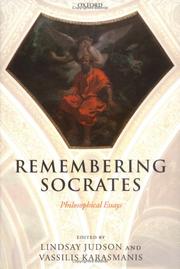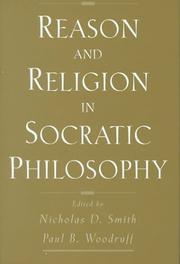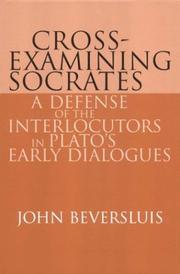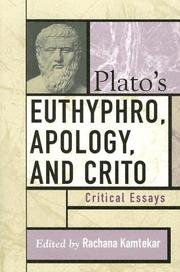| Listing 1 - 10 of 79 | << page >> |
Sort by
|
Book
ISBN: 9789004396746 9004396748 9004396756 9789004396753 Year: 2019 Publisher: Leiden Brill
Abstract | Keywords | Export | Availability | Bookmark
 Loading...
Loading...Choose an application
- Reference Manager
- EndNote
- RefWorks (Direct export to RefWorks)
"Brill's Companion to the Reception of Socrates, edited by Christopher Moore, provides almost unbroken coverage, across three-dozen studies, of 2450 years of philosophical and literary engagement with Socrates - the singular Athenian intellectual, paradigm of moral discipline, and inspiration for millennia of philosophical, rhetorical, and dramatic composition. Following an Introduction reflecting on the essentially "receptive" nature of Socrates' influence (by contrast to Plato's), chapters address the uptake of Socrates by authors in the Classical, Hellenistic, Roman, Late Antique (including Latin Christian, Syriac, and Arabic), Medieval (including Byzantine), Renaissance, Early Modern, Late Modern, and Twentieth-Century periods. Together they reveal the continuity of Socrates' idiosyncratic, polyvalent, and deep imprint on the history of Western thought, and witness the value of further research in the reception of Socrates"--
Socrates. --- Rezeption. --- Socrates, --- Socrates --- Socrate --- Sokrates --- Sokrat, --- Sokrates, --- Suqrāṭ, --- Su-ko-la-ti, --- Sugeladi, --- Sokuratesu, --- Sākreṭīsa, --- Socrate, --- سقراط, --- Σωκράτης,

ISBN: 1280755296 9786610755295 0191557056 0191565369 1423767942 9780191557057 9781423767947 0199276137 9780199276134 0199276137 9780191565366 9781280755293 6610755299 1383041954 Year: 2005 Publisher: Oxford Clarendon
Abstract | Keywords | Export | Availability | Bookmark
 Loading...
Loading...Choose an application
- Reference Manager
- EndNote
- RefWorks (Direct export to RefWorks)
The authors present a selection of philosophical papers by an international team of scholars, assessing the legacy and continuing relevance of Socrates' thought 2,400 years after his death.
Philosophy & Religion --- Philosophy --- Socrates --- Socrate --- Socrates. --- Sokrates --- Sokrat, --- Sokrates, --- Suqrāṭ, --- Su-ko-la-ti, --- Sugeladi, --- Sokuratesu, --- Sākreṭīsa, --- Socrate, --- سقراط, --- Σωκράτης,

ISBN: 1280472987 0195350928 1423760530 9781423760535 9781280472985 9780195350920 0195133226 9780195133226 0197731481 Year: 2000 Publisher: New York : Oxford University Press,
Abstract | Keywords | Export | Availability | Bookmark
 Loading...
Loading...Choose an application
- Reference Manager
- EndNote
- RefWorks (Direct export to RefWorks)
This volume brings together mostly previously unpublished studies by prominent historians, classicists, and philosophers on the roles and effects of religion in Socratic philosophy and on the trial of Socrates. Among the contributors are Thomas C. Brickhouse, Asli Gocer, and Paul B. Woodruff.
Religion --- Philosophy. --- Socrates --- Socrate --- Religion. --- Sokrates --- Sokrat, --- Sokrates, --- Suqrāṭ, --- Su-ko-la-ti, --- Sugeladi, --- Sokuratesu, --- Sākreṭīsa, --- Socrate, --- سقراط, --- Σωκράτης, --- Faith and reason.

ISBN: 9786612072529 1282072528 025311151X 9780253111517 0253346770 9780253346773 0253218160 9780253218162 Year: 2005 Publisher: Bloomington Indiana University Press
Abstract | Keywords | Export | Availability | Bookmark
 Loading...
Loading...Choose an application
- Reference Manager
- EndNote
- RefWorks (Direct export to RefWorks)
Since the appearance of Plato's Dialogues, philosophers have been preoccupied with the identity of Socrates and have maintained that successful interpretation of the work hinges upon a clear understanding of what thoughts and ideas can be attributed to him. In Descent of Socrates, Peter Warnek offers a new interpretation of Plato by considering the appearance of Socrates within Plato's work as a philosophical question. Warnek reads the Dialogues as an inquiry into the nature of Socrates and in doing so
Plato. --- Socrates. --- Socrates --- Socrate --- Sokrates --- Sokrat, --- Sokrates, --- Suqrāṭ, --- Su-ko-la-ti, --- Sugeladi, --- Sokuratesu, --- Sākreṭīsa, --- Socrate, --- سقراط, --- Σωκράτης,
Book
ISBN: 0791477665 1441621075 9781441621078 9780791477663 0791475832 0791475840 9780791475836 9780791475843 Year: 2008 Publisher: Albany, NY State University of New York Press
Abstract | Keywords | Export | Availability | Bookmark
 Loading...
Loading...Choose an application
- Reference Manager
- EndNote
- RefWorks (Direct export to RefWorks)
Erotic Wisdom provides a careful reading of one of Plato's most beloved dialogues, the Symposium, which explores the nature and scope of human desire (erôs). Gary Alan Scott and William A. Welton engage all of the dialogue's major themes, devoting special attention to illuminating Plato's conception of philosophy. In the Symposium, Plato situates philosophy in an intermediate (metaxu) position—between need and resource, ignorance and knowledge—showing how the very lack of what one desires can become a guiding form of contact with the objects of human desire. The authors examine the concept of intermediacy in relation both to Platonic metaphysics and to Plato's moral psychology, arguing that philosophy, for Plato, is properly understood as a kind of "being in-between," as the love of wisdom (philosophia) rather than the possession of it.
Love --- Plato. --- Socrates. --- Socrates --- Socrate --- Sokrates --- Sokrat, --- Sokrates, --- Suqrāṭ, --- Su-ko-la-ti, --- Sugeladi, --- Sokuratesu, --- Sākreṭīsa, --- Socrate, --- سقراط, --- Σωκράτης,

ISBN: 051115237X 0511017219 9780511017216 9780521550581 0521550580 9780511152375 Year: 2000 Publisher: Cambridge New York Cambridge University Press
Abstract | Keywords | Export | Availability | Bookmark
 Loading...
Loading...Choose an application
- Reference Manager
- EndNote
- RefWorks (Direct export to RefWorks)
This book is a re-reading of the early dialogues of Plato from the point of view of the people with whom Socrates engages in debate. It takes these interlocutors seriously and treats them as genuine intellectual opponents whose views are often more defensible than commentators have standardly thought.
Sophists (Greek philosophy) --- Philosophy, Ancient --- Plato. --- Socrates. --- Socrates --- Socrate --- Sokrates --- Sokrat, --- Sokrates, --- Suqrāṭ, --- Su-ko-la-ti, --- Sugeladi, --- Sokuratesu, --- Sākreṭīsa, --- Socrate, --- سقراط, --- Σωκράτης,
Book
ISBN: 0585055300 9780585055305 Year: 1987 Publisher: Albany : State University of New York Press,
Abstract | Keywords | Export | Availability | Bookmark
 Loading...
Loading...Choose an application
- Reference Manager
- EndNote
- RefWorks (Direct export to RefWorks)
Methodology --- History. --- Socrates --- Socrate --- Contributions in methodology. --- Humanities Methodology --- Sokrates --- Sokrat, --- Sokrates, --- Suqrāṭ, --- Su-ko-la-ti, --- Sugeladi, --- Sokuratesu, --- Sākreṭīsa, --- Socrate, --- سقراط, --- Σωκράτης,
Book
ISBN: 1281725064 9786611725068 1443808997 9781443808996 Year: 2008 Publisher: Newcastle, U.K. : Cambridge Scholars Pub.,
Abstract | Keywords | Export | Availability | Bookmark
 Loading...
Loading...Choose an application
- Reference Manager
- EndNote
- RefWorks (Direct export to RefWorks)
Socrates represents a turning point in the history of Greek thought. He achieved radical changes in the way of thinking and obtaining knowledge Otherout writing even one word. But through his discussions Other his students and contemporary artists and philosophers, he exposed the intellectual vices and failings that dominated Athenian life in the last 30 years of the 5th century B.C., a time that witnessed the disintegration of Athenian Democracy, especially after the Peloponnesian wars which e...
Socrates --- Socrate --- Sokrates --- Sokrat, --- Sokrates, --- Suqrāṭ, --- Su-ko-la-ti, --- Sugeladi, --- Sokuratesu, --- Sākreṭīsa, --- Socrate, --- سقراط, --- Σωκράτης,
Book
ISBN: 276370803X 1459337190 1441609652 9781441609656 Year: 2009 Publisher: Quebec Presses de l'Universitaé Laval
Abstract | Keywords | Export | Availability | Bookmark
 Loading...
Loading...Choose an application
- Reference Manager
- EndNote
- RefWorks (Direct export to RefWorks)
Socrates --- Socrate --- Sokrates --- Sokrat, --- Sokrates, --- Suqrāṭ, --- Su-ko-la-ti, --- Sugeladi, --- Sokuratesu, --- Sākreṭīsa, --- Socrate, --- سقراط, --- Σωκράτης,


ISBN: 0742533247 1461640946 9781461640943 0742533255 9780742533257 1299795218 9781299795211 Year: 2004 Publisher: Lanham Rowman & Littlefield Publishers
Abstract | Keywords | Export | Availability | Bookmark
 Loading...
Loading...Choose an application
- Reference Manager
- EndNote
- RefWorks (Direct export to RefWorks)
Plato's Euthyrphro, Apology, andCrito portray Socrates' words and deeds during his trial for disbelieving in the Gods of Athens and corrupting the Athenian youth, and constitute a defense of the man Socrates and of his way of life, the philosophic life. The twelve essays in the volume, written by leading classical philosophers, investigate various aspects of these works of Plato, including the significance of Plato's characters, Socrates's revolutionary religious ideas, and the relationship between historical events and Plato's texts.
Plato. --- Socrates. --- Socrates --- Socrate --- Sokrates --- Sokrat, --- Sokrates, --- Suqrāṭ, --- Su-ko-la-ti, --- Sugeladi, --- Sokuratesu, --- Sākreṭīsa, --- Socrate, --- سقراط, --- Σωκράτης,
| Listing 1 - 10 of 79 | << page >> |
Sort by
|

 Search
Search Feedback
Feedback About UniCat
About UniCat  Help
Help News
News